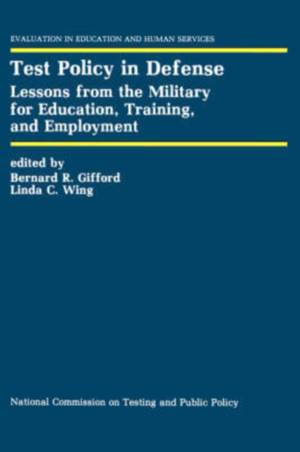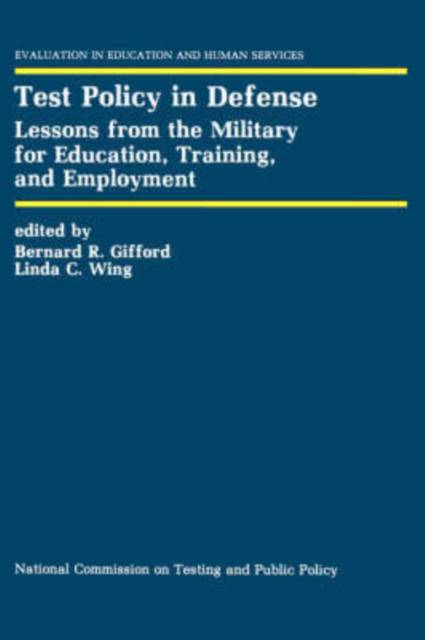
- Afhalen na 1 uur in een winkel met voorraad
- Gratis thuislevering in België vanaf € 30
- Ruim aanbod met 7 miljoen producten
- Afhalen na 1 uur in een winkel met voorraad
- Gratis thuislevering in België vanaf € 30
- Ruim aanbod met 7 miljoen producten
Zoeken
Test Policy in Defense
Lessons from the Military for Education, Training, and Employment
€ 167,95
+ 335 punten
Omschrijving
Bernard R. Gifford and Linda C. Wing Standardized testing has become a ubiquitous feature of American life. As a major source of information for reducing uncertainty in the alJocation of merit- based educational, training, and employment opportunities, testing affects the life chances of individuals. Moreover, testing inOuences the way in which our societyjudgesitselfandprovides for ourcollective future. Test scores may determine a child's admission to lcindergarten and promotion to the fIrst grade. Most states award the high school diploma only ifa student has passed a minimum competency test. Major institutions of higher education typically require applicants to supplement their records of academic achievement with scores on college admissions tests. In the labor market, as a condition of employment or assignment to training programs, more and more employers are requiring workers to sit for personnel selection tests. Additionally, it has become commonplace to use test scores to calibrate our national sociopolitical condition and our capacity to compete with other countries in the global economy. In short, with increasing frequency and intensity, scores on examinations that purport to be objective and precise measures of individual knowledge, abilities, and potential are playing a critical role in the opportunity marketplace. Similarly, test scores are exercising growing influence in assessments of our social and economic institutions and in policy decisions about the relative invesunents that should be made in each. In all these instantiations, test scores are at the center of high-stakes decision making about the future of individuals and of the nation itself.
Specificaties
Betrokkenen
- Uitgeverij:
Inhoud
- Aantal bladzijden:
- 270
- Taal:
- Engels
- Reeks:
- Reeksnummer:
- nr. 31
Eigenschappen
- Productcode (EAN):
- 9780792391760
- Verschijningsdatum:
- 30/11/1991
- Uitvoering:
- Hardcover
- Formaat:
- Genaaid
- Afmetingen:
- 156 mm x 234 mm
- Gewicht:
- 585 g

Alleen bij Standaard Boekhandel
+ 335 punten op je klantenkaart van Standaard Boekhandel
Beoordelingen
We publiceren alleen reviews die voldoen aan de voorwaarden voor reviews. Bekijk onze voorwaarden voor reviews.










